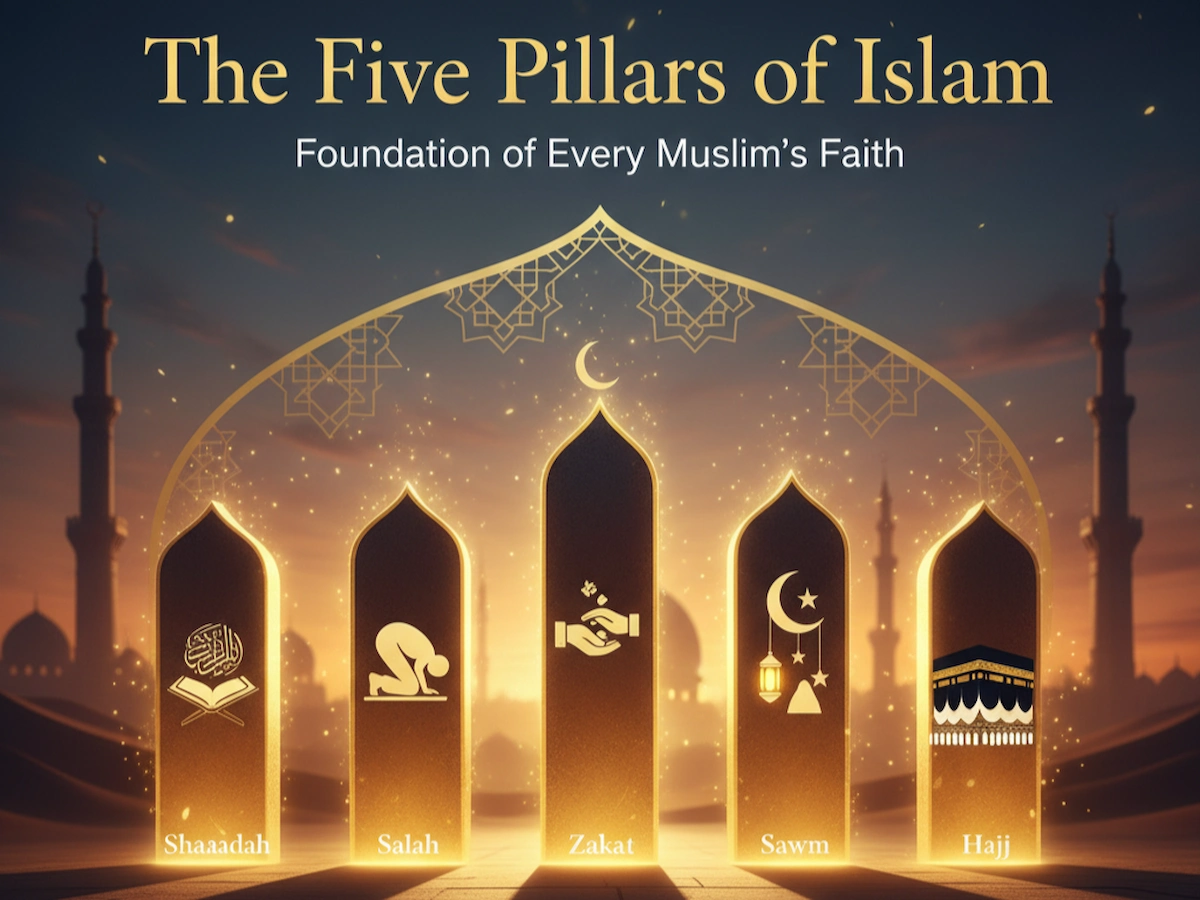The Five Pillars of Islam are the core principles that form the foundation of a Muslim’s life. They were explained clearly in the Hadith of Gabriel, where Prophet Muhammad (ﷺ) described what makes a person a true believer.

These five pillars represent faith, worship, charity, self-discipline, and unity – guiding Muslims to live a life of devotion to Allah (SWT).
1. Shahada (Declaration of Faith)
لَا إِلَٰهَ إِلَّا ٱللَّهُ مُحَمَّدٌ رَسُولُ ٱللَّهِ
Transliteration: La ilaha illa Allah, Muhammadur Rasul Allah
Meaning: There is no deity but Allah, and Muhammad is the Messenger of Allah.
The Shahada is the very first pillar and the foundation of Islam.
By reciting it sincerely, a person declares their belief in the Oneness of Allah and accepts Prophet Muhammad (ﷺ) as His final messenger.
This declaration marks one’s entry into Islam — it is a statement of belief, love, and complete submission to Allah (SWT).
2. Salah (Prayer)
Arabic:
يجب على كل مسلم أن يؤدي الصلاة خمس مرات في اليوم طوال حياته.
Meaning: Every Muslim must perform five daily prayers throughout their life.
Salah is the second pillar of Islam and a direct connection between a Muslim and Allah. Muslims are required to pray five times a day – Fajr, Dhuhr, Asr, Maghrib, and Isha.
Salah teaches discipline, spiritual focus, humility, and unity. It reminds us of our purpose – to worship Allah and stay connected with Him at all times.
3. Zakat (Almsgiving)
Arabic:
فعل المسلم أن يتبرع بجزء من أمواله كل عام للمحتاجين (الفقراء).
Meaning: Muslims give a portion of their wealth each year to the needy (poor).
Zakat is the third pillar of Islam. Every Muslim who possesses wealth above a certain limit (nisab) must give 2.5% of their savings annually to those in need.
This purifies wealth, reduces inequality, and strengthens the bond of compassion within the Muslim Ummah.
4. Sawm (Fasting during Ramadan)
Arabic:
الصيام هو القيام بجميع الأعمال خلال شهر رمضان المبارك.
Meaning: Fasting during the blessed month of Ramadan is a duty upon every Muslim who is able.
Sawm means fasting – abstaining from food, drink, and sinful actions from dawn (Fajr) to sunset (Maghrib) during the month of Ramadan. It is the fourth pillar of Islam and a time of spiritual reflection, self-control, and gratitude.
Through fasting, Muslims develop empathy for the poor and strengthen their faith and patience.
5. Hajj (Pilgrimage to Mecca)
Arabic:
يجب على كل مسلم الحج إلى مكة المكرمة مرة واحدة في حياته على الأقل إذا استطاع إلى ذلك سبيلا.
Meaning: Every Muslim must perform pilgrimage to Mecca at least once if physically and financially able.
Hajj is the fifth and final pillar of Islam.
It takes place during the month of Dhul-Hijjah and includes several sacred rituals such as Tawaf, Sa’i, standing at Arafat, and animal sacrifice (Qurbani).
Hajj symbolizes equality, unity, and submission — all pilgrims wear the same white garments, standing together before Allah with humility and devotion.
Why the Five Pillars Are Important
Each pillar strengthens a different aspect of a Muslim’s life – faith, worship, social responsibility, self-discipline, and unity.
Together, they build a complete spiritual framework that helps Muslims live a balanced and meaningful life according to Allah’s commands.



